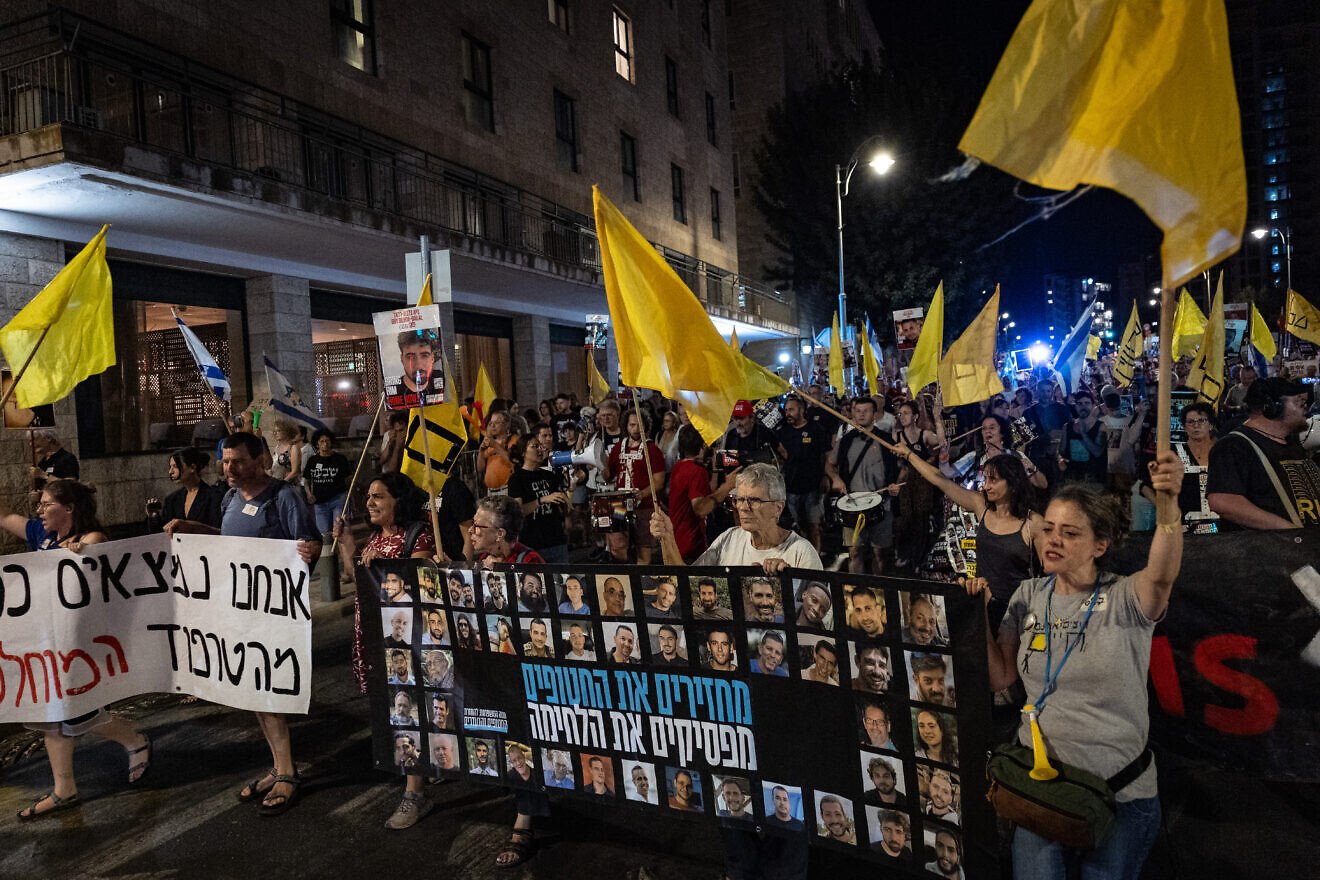When even consensus in Israel is contentious
Both the government and those who oppose it want all the hostages to come home in one fell swoop and for the war to end. So, what’s the fight about?
By Ruthie Blum
JNS
Aug 24, 2025
Consensus is so hard to come by in Israel that even when it exists, it’s a source of strife. The issue of the hostages’ rescue is a perfect case in point.
At this juncture, everyone agrees that all 50 captives—20 of them living—have to be freed together. In other words, no more partial deals that involve a Nazi-like selection process determined by Hamas.
Rather than alignment on this score, however, the protest movement is demanding that Israeli Prime Minister Benjamin Netanyahu send a delegation back to the negotiating table to engage in talks over the very “Witkoff plan” that involves the return of half of the hostages in a phased ceasefire arrangement.
The backdrop, and the reason that Hamas suddenly expressed willingness to reconsider Mideast envoy Steve Witkoff’s previous blueprint, is the Cabinet’s decision to launch a major military operation to take over Gaza City—the terrorist group’s last stronghold in the Strip—and finally conclude the war. It’s important to note that the protest movement is also calling for an end to the war.
The way it’s doing this is through anti-government demonstrations. Anyone unfamiliar with the Israeli psyche might find this peculiar. After all, both the government and those who oppose it want all the hostages to come home in one fell swoop and for the war to finally be over.
Ditto for U.S. President Donald Trump, who declared last Monday on Truth Social: “We will only see the return of the remaining hostages when Hamas is confronted and destroyed. The sooner this happens, the greater the chances of success.”
Still, the “anybody but Bibi” sector, which includes some of the hostage families, seems to believe that losing the war is a better path. Though wrong about that, fear that the move on Gaza City will endanger the hostages is utterly understandable.
Tuesday marked the Hebrew anniversary of the murder by their captors of six hostages—Hersh Goldberg-Polin, Eden Yerushalmi, Ori Danino, Carmel Gat, Almog Sarusi and Alexander Lobanov—when Israeli forces approached the area of the tunnel where they were being held. There’s no question that such an incident could happen in Gaza City, as well.
What those who oppose the operation refuse to internalize, however, is that Hamas will never hand over the only leverage it’s got left. Understanding the Jewish mindset, it knows full well that keeping even a single innocent Israeli in its clutches is sufficient to cause sincere countrywide concern and deep societal divisions. Let’s not forget the national focus on Gilad Shalit, the young IDF corporal held by Hamas for five years, without which Oct. 7 mastermind Yahya Sinwar wouldn’t have been among the more than 1,000 killers freed in 2011.
Nor are those who seek to end the war without an Israeli victory facing an inconvenient fact: Making any deal with the perpetrators of the worst atrocities against Jews since the Holocaust—certainly a contract that leaves the monsters in power—puts the life of every Israeli civilian, soldier and hostage at risk. Now and in the future.
Furthermore, the current message to jihadists around the globe is clear: Kidnapping is the most successful weapon against Western enemies, no matter how mighty their armies may be.
Capitulation to Hamas also means erasing the efforts—and accomplishments—of the hundreds of men and women in uniform who fell or were wounded during the past nearly two years. This hasn’t prevented the ongoing tantrum by a vociferous minority bent on pushing Netanyahu to do just that.
Following last Sunday’s nationwide disruption of traffic and workflow, protesters blocked roads on Friday evening and parked themselves outside of the prime minister’s Jerusalem residence, bearing the slogan, “Netanyahu, leave the Shabbat table and move to the negotiating table.”
Similar demonstrations took place in Tel Aviv on the Ayalon Highway—where a symbolic “Shabbat table” was set on fire—and on Route 6 in the north. These preceded the usual Saturday-night gathering at Hostages Square, where this weekend participants accused Strategic Affairs Minister Ron Dermer of being behind Trump’s tough stance.
Yet Netanyahu said on Thursday that he’d directed a delegation to be prepared for a new round of deliberations—presumably in Doha or Cairo—for the release of all the hostages. Which is ostensibly the goal of the protesters, right?
Apparently not.
Because his statement basically coincided with the mobilization of reservists for the capture of Gaza City—a wise carrot-and-stick tactic—the disgruntled mob not only wasn’t assuaged; it decided to stage another “day of rage” for this coming Tuesday. Never mind that it’s going to be difficult, if not impossible, for people to commute to work or anywhere else.
Nor is it merely a nuisance. It actually does little to garner support from the general public and much to persuade Hamas that Israel is on the verge of imploding—and that Netanyahu won’t be able to withstand the pressure. Thankfully, the only thing further from the truth is the insidious claim that he or any other Israeli is indifferent to the suffering and fate of the hostages.

No comments:
Post a Comment